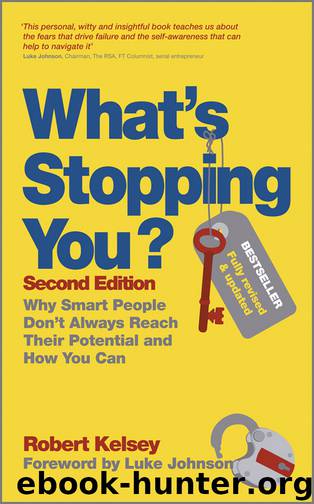What's Stopping You by Robert Kelsey

Author:Robert Kelsey
Language: eng
Format: epub
Publisher: Wiley
Published: 2012-06-05T04:00:00+00:00
The False Hope of Ideas
Like judgements, ideas are key execution tool. And, again, they are a problematic area for those handicapped with a high fear of failure. Many High-FFs are very good at generating ideas, although most High-FFs fall at the first hurdle when it comes to implementation. Over time, this renders us incapable of differentiating between good and bad ideas, which – sadly – leaves us haunted by our creativity (especially when we see our ideas being implemented by others). For those with a high fear of failure ideas can seem like pipe-dreams, often giving us nothing more than false hope and an additional layer of frustration.
Other High-FFs, however, can struggle to think imaginatively – perhaps because, so trapped are they in their current status, they have switched off their creative brain. So while the sensitivity of the High-FF lends itself to creativity, poor experiences may mean we have extinguished the flame or – potentially worse – become tormented by our own ideas.
And this is bad news when trying to implement a strategy for meeting our objectives because navigating the inevitable “rocks in the river” (to quote Robbins) requires strong imagination as well as strong judgement.
According to advertising executive Jack Foster in How to Get Ideas (1996) people who come up with good ideas know they exist and know they will find them, which can, initially, seem unhelpful. What if we are not confident good ideas exist? If Foster states that the most important factor needed for successful idea generation is self-belief, then those without it are surely doomed, at least in terms of idea generation.
But there is hope. For Foster the key problem is being a grown up. Adults think too much. They are hampered by experience, which – for those with a high fear of failure – is usually negative experience. Boundaries, rules, fears: all crowd in on the adult trying to generate ideas.
So the answer is to be more like children. As children we all indulged in imaginative play without rules or boundaries, so we need – once again – to tap into that childlike freedom of illogical and silly creativity.
“Kids are natural born scientists,” says Foster, quoting astronomer Carl Sagan. “First of all they ask the deep scientific questions. Why is the moon round? … By the time they get into High School they hardly ever ask questions like that.”
For the High-FF, this is because the fear of failure has kicked in – with all the attendant concerns regarding public humiliation.
Yet nearly all children go through the “why” stage, and we should do our best to return to that wonderfully creative period when young eyes are looking and articulating thoughts and ideas for the first time.
In fact this is highly possible for the High-FF. As stated, High-FFs are often sensitive types that have ideas but then fear the criticism airing such ideas may bring. Yet this is no different to any creative: designers, writers, artists are all overly sensitive to criticism. The difference between them and us (as High-FFs) is that they manage to overcome their fears.
Download
This site does not store any files on its server. We only index and link to content provided by other sites. Please contact the content providers to delete copyright contents if any and email us, we'll remove relevant links or contents immediately.
Pioneering Portfolio Management by David F. Swensen(6303)
Man-made Catastrophes and Risk Information Concealment by Dmitry Chernov & Didier Sornette(6022)
Zero to One by Peter Thiel(5805)
The Motivation Myth by Jeff Haden(5214)
The Miracle Morning by Hal Elrod(4732)
Elon Musk by Ashlee Vance(4129)
Unlabel: Selling You Without Selling Out by Marc Ecko(3667)
The Art of Persistence: Stop Quitting, Ignore Shiny Objects and Climb Your Way to Success by Michal Stawicki(3661)
Delivering Happiness by Tony Hsieh(3430)
Urban Outlaw by Magnus Walker(3400)
Purple Cow by Seth Godin(3205)
The Marketing Plan Handbook: Develop Big-Picture Marketing Plans for Pennies on the Dollar by Robert W. Bly(3067)
Mastering Bitcoin: Programming the Open Blockchain by Andreas M. Antonopoulos(3047)
The Power of Broke by Daymond John(2989)
The Content Trap by Bharat Anand(2927)
Applied Empathy by Michael Ventura(2906)
The Airbnb Story by Leigh Gallagher(2861)
Keep Going by Austin Kleon(2767)
Radical Candor by Kim Scott(2724)
